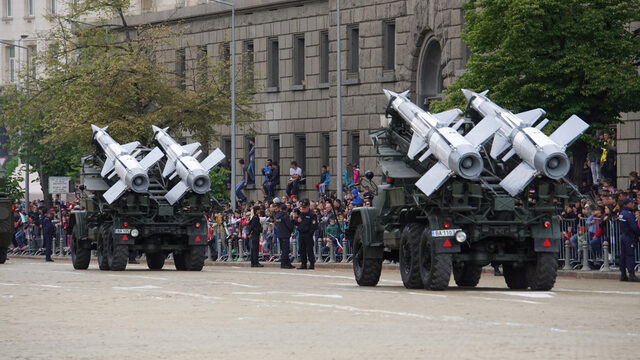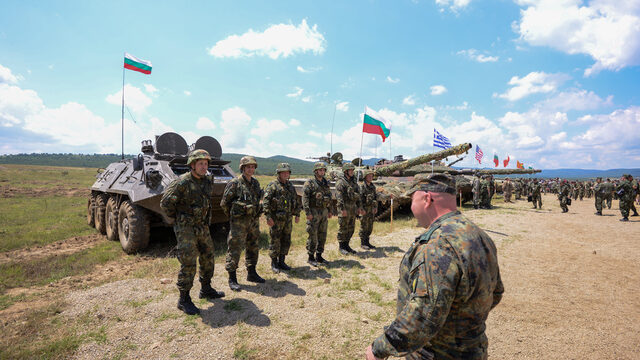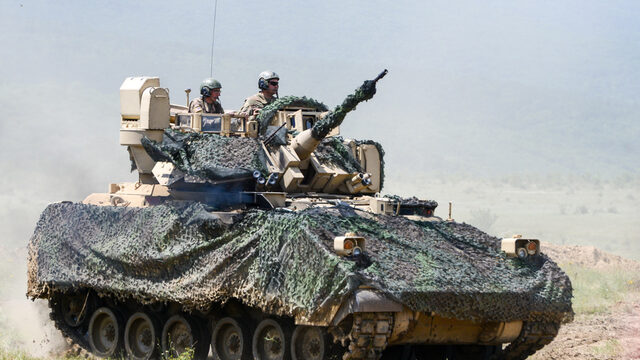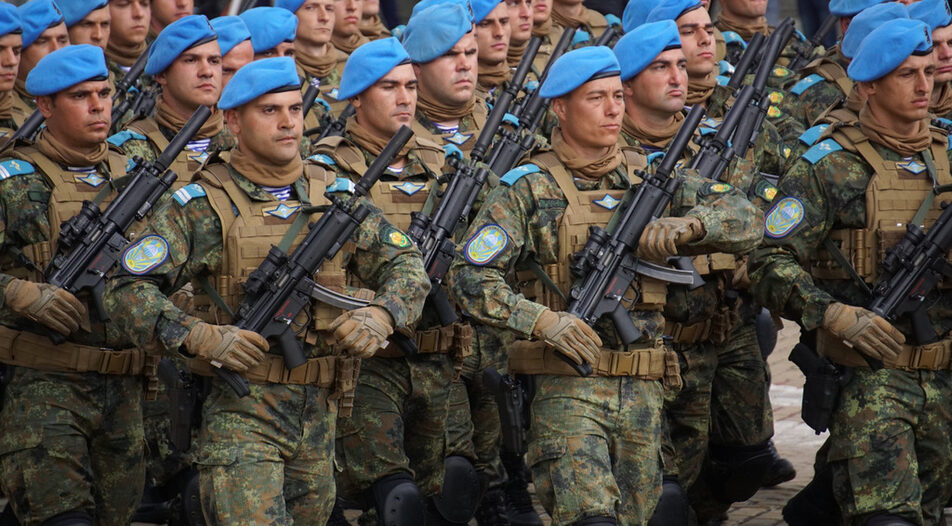Bulgaria's military has notoriously suffered from underfunding and lack of modernization over the past three decades. Aside from the deal for new fighter jets that was signed after years of delay and is yet to produce any tangible benefits on the airforce, investment in the army has practically been negligible. The unexpected invasion of Ukraine has swiftly exposed all of these deficits - but has also opened up a debate about the future of the Bulgarian Armed Forces, far beyond their rearmament.
The new concept for the army, as presented two weeks ago by recently appointed Defense Minister Dragomir Zakov, centers on the development of combat capabilities necessary for active defense in the Bulgarian Black Sea coast region. The plan includes nine key investment projects to improve the capacity of the army, but it also seeks to integrate it better within common NATO structures, taking advantage of the Alliance's resurgent interest in its Eastern flank in the aftermath of the Ukraine war.
"It is time to make decisions of national importance. They are not always popular... Bulgarian citizens and servicemen do not just need an army and armed forces. We need a fighting and combat-ready army that can protect us. We need to update key military capabilities, but that means serious spending that will have to be dedicated to that end," Mr Zakov said. He added, however, that if the taxpayer would have to bear such significant costs, two key things ought to be guaranteed: "that these funds will be spent on real combat capabilities and in a transparent manner".
Nine priorities:

Minister Zakov formulated nine priority projects that will be at the heart of the modernization of the Bulgarian army in the coming years. These include the acquisition of a new type of armored fighting vehicle for the Land Forces (that was supposed to happen in the last year of GERB rule, but the 1.5 billion BGN dedicated for the project turned out to be insufficient), artillery support capabilities, 3D radars, modern air defense units, drones, diesel-electric submarines to revive Bulgarian underwater warfare capabilities, naval ammunition, coastal missile complexes and field communication and information equipment.
Notably, two thirds of the listed military modernization programs are directly or indirectly aimed at the protection of the Bulgarian coast and/or water area. The brand new projects, which so far have not been mentioned outside the professional military community, are the modernization of artillery, air defense systems to protect the mechanized infantry, coastal anti-ship complexes and, to some extent, drones, the acquisition of which has so far been discussed only in principle.
It remains to be seen whether the capabilities in question will be acquired separately or whether the Bulgarian army will try to integrate them into a mega-programme for the modernization of land forces. The latter would be quite risky, since the previous attempt to launch the project for new armored fighting vehicles alone exceeded its budget by half a billion BGN and reached amounts exceeding 2 billion BGN (including VAT) for both bidding projects. If artillery systems, air defense, drones and possibly anti-ship missiles are added, the sum could easily go towards 4 billion BGN - something that would be hard to swallow in one go by Bulgarian taxpayers.
The Bulgarian battle group turns Italian?

In addition to the draft plan that will be proposed to the National Assembly in the coming weeks, another idea of crucial importance continued to evolve in the past few weeks - that of a Bulgarian-led NATO battle group. According to Mr Zakov, the formation will most likely remain under Bulgarian command, but will pass under the umbrella of the 2nd brigade of the Army's Ground Forces. The NATO Supreme Commander for Europe would still remain on top of the command and control pyramid.
The leading force of the battle group, however, will most likely not be from the Bulgarian army, but Italy, which, according to the Minister of Defense, has expressed its readiness to join the battle group "with a rather serious contingent of troops." According to information circulated by NATO recently, some 900 allied troops are to be deployed in Bulgaria. So far, the United States, Albania and Britain have officially joined the group with one company each. The Bulgarian army is supposed to participate in the formation with one purely Bulgarian battalion.

The idea of integrating the multinational NATO group within the army's 2nd Land Brigade is quite a good option. This way, the combat unit remains both under direct Bulgarian command, while strengthening its main infantry unit, which generally suffers from a serious shortage of modern NATO equipment, with additional combat capabilities. Also, in this way the Bulgarian part of the new battlegroup will not encroach upon the capabilities of the 61st Mechanized Brigade, Bulgaria's best equipped military unit, which has been declared as the Bulgarian contribution to the 40,000-strong NATO Response Force and which should be ready for use in case Article 5 of the Alliance is activated. Thus, while the 2nd Brigade gets reinforced with allied forces and assets, the Bulgarian Ministry of Defense will be able to focus on modernizing the 61st Brigade and other units by using national resources under the military projects described above.
Upgrading the fleet
On the naval front, it appears that the military authorities continue working on the acquisition of two second hand diesel-electric submarines without much ado - most likely from Norway or Italy. The fact that the government in Rome has expressed interest in a possible leading role in the Bulgarian NATO battlegroup may tip the scales in favor of the second option. The most likely option would entail the acquisition of two Sauro-class submarines produced in the 1980s.
The reinforcement of NATO's Black Sea flank will almost certainly entail the modernization of the Bulgarian and Romanian navies, since the so-called Montreux Convention that restricts the access of military vessels from non-Black Sea countries.
Against this backdrop, Bulgaria's Chief of Defense Admiral Emil Eftimov has said that Sofia is placing one of the two old Dutch minesweepers that the fleet acquired in 2019 in operational readiness. Negotiations for the acquisition of more vessels are underway with Belgium, from which our navy received three frigates and one minesweeper a few years ago. According to Admiral Eftimov, Sofia missed an opportunity to buy "at a political price" another ship from the Netherlands, which, however, went "to a neighboring country", most likely Romania.
In the context of the above mentioned projects for the rapid acquisition of used NATO warships, the priority programme for the purchase of new munitions for the navy is of top importance - it is a public secret that anti-ship and anti-aircraft missiles mounted on the Bulgarian military vessels are at the end of their service life.
Regarding the incidents of encountered sea mines found in the Black Sea, Admiral Eftimov announced that daily monitoring is carried out along the established routes for maritime traffic in Bulgarian waters. He maintains there is no need to ask NATO to send the alliance's permanent mine action group as we are talking about floating explosive devices. The alliance's specialized flotilla is mostly designed to clear areas where there are anchor or bottom mines. In the current situation, suspicious objects are mostly detected visually, "so any naval vessel or aircraft can be effective enough," the admiral summarizes.
The fundamental problem for the Bulgarian military modernization process, however, is likely not going to be funding of projects and delivering capabilities, but people in uniform. Even if the army has the most advanced weapons, the question remains who will be operating them. Unfortunately, the military profession is currently rather unattractive, and most professional soldiers are almost old enough to be parents of privates in Western armies.
Changing that perception through better remuneration for the professional soldier, but also through understanding on a societal level why homeland defense is important - just as Ukrainians did in the past 8 years, the results of which we are seeing now on the frontlines with Russia - is of key importance.
Bulgaria's military has notoriously suffered from underfunding and lack of modernization over the past three decades. Aside from the deal for new fighter jets that was signed after years of delay and is yet to produce any tangible benefits on the airforce, investment in the army has practically been negligible. The unexpected invasion of Ukraine has swiftly exposed all of these deficits - but has also opened up a debate about the future of the Bulgarian Armed Forces, far beyond their rearmament.
The new concept for the army, as presented two weeks ago by recently appointed Defense Minister Dragomir Zakov, centers on the development of combat capabilities necessary for active defense in the Bulgarian Black Sea coast region. The plan includes nine key investment projects to improve the capacity of the army, but it also seeks to integrate it better within common NATO structures, taking advantage of the Alliance's resurgent interest in its Eastern flank in the aftermath of the Ukraine war.












